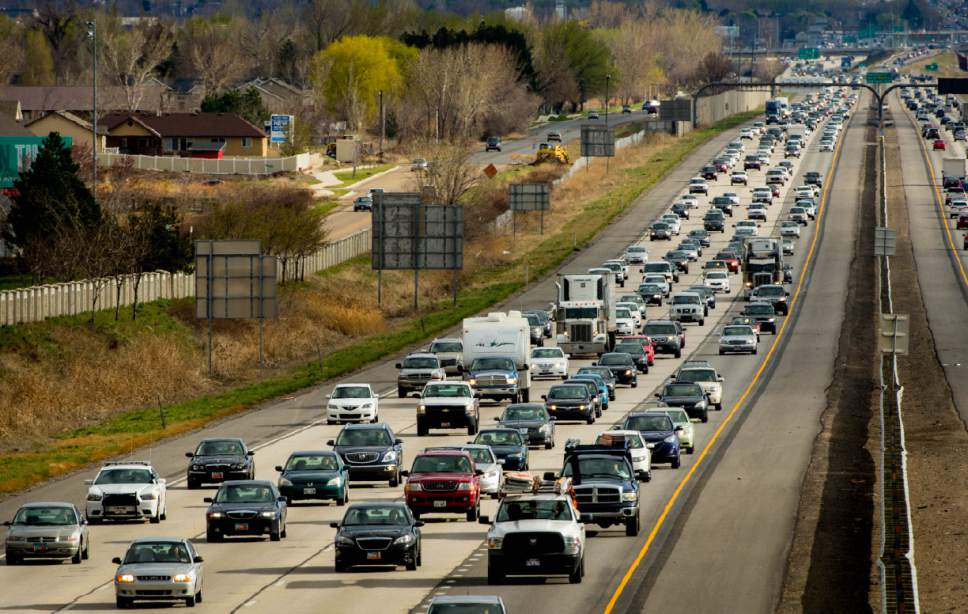This is an archived article that was published on sltrib.com in 2015, and information in the article may be outdated. It is provided only for personal research purposes and may not be reprinted.
While traffic congestion is a big problem in the Salt Lake metro area, traffic is still generally better here than in almost all other large urban areas in the United States.
That's according to the annual 2015 Urban Mobility Scorecard released Wednesday by the Texas A&M Transportation Institute and the company INRIX.
It reports:
• Congestion caused each Salt Lake area commuter an average 37 hours of delay in 2014. That ranks 66th worst out of 471 urban areas nationally. But it is second best among 46 large and very large urban areas. It is well under the average of 45 hours of delay for other large urban areas.
For all Salt Lake-area drivers combined, congeestion caused 26.9 million hours of delay for commuters, 51st worst in the nation.
• In order to reliably arrive on time for important freeway trips, Salt Lakers must allow 42.6 minutes to make a trip in peak driving times that takes 20 minutes in light traffic. That is 49th worst among the nation's urban areas. But it is better than the 49.2-minute average in large urban areas.
• On average, Salt Lake area commuters each waste 22 gallons of gas a year because of delays from congestion. That ranks 23rd worst among all urban areas. Combined for all drivers, 16.3 million gallons of fuel are wasted, 46th worst in the nation.
• The congestion cost per commuter for time and fuel is $1,059 in the Salt Lake area, 31st worst nationally. The average for large urban areas is $1,045 per commuter. Combined for all Salt Lake area drivers, congestion cost $779 million, 46th worst in the nation.
Carlos Braceras, executive director of the Utah Department of Transportation, said Utah governors and the Legislature have worked hard to decrease congestion in recent years, including a $2 billion project to rebuild Interstate 15 in Utah County, rebuilding I-15 around the Point of the Mountain now and, just last week, finishing improvements on I-15 in southern Davis County.
"Elected officials understand the connection between congestion and our economy," Braceras said.
"We've been doing a lot of projects. It's not just roads, but transit as well. We have a world-class transit system," he said. The Utah Transit Authority (UTA) recently completed 70 miles of new rail projects in seven years.
The study said congestion is getting worse nationally — and was worse in 95 of the 100 largest metro areas last year. It said 3.1 billion gallons of fuel were wasted nationally last year — equal to more than 90 minutes worth of flow in the Missouri River.
"Congestion will continue to increase if projects, programs and policies are not expanded," the study said.
The Legislature took some steps this year to address a projected $11 billion shortfall in priority transportation projects identified in the state through 2040.
That included passing HB362, which will raise the state's gasoline tax for the first time in 18 years. That increase of about 5 cents a gallon will take effect Jan. 1, and the new law allows automatic increases tied to inflation in subsequent years.
That bill also allows counties to put a sales-tax increase for transportation on the ballot. If approved, it would cost consumers a penny for every $4 in purchases. In counties with a transit agency, such as the UTA, 40 percent of the money will go to transit, and the rest will go to cities and counties for local roads.
Sixteen counties — including Salt Lake County and all the large counties along the Wasatch Front — have voted to put that tax increase on the Nov. 3 ballot. Legislative analysts predict it will cost about $50 per resident annually.
The new congestion study also included some data for smaller urban areas in Utah.
In Provo-Orem, researchers said commuters each waste an average of 21 hours a year because of congestion (94th worst nationally) and 15 extra gallons of fuel a year (ranking 78th), and congestion costs $708 each per commuter (ranking 83rd).
The study also said that to reliably arrive on time for freeway trips, Provo commuters must allow 30.6 minutes for peak-hour trips that normally take 20 minutes (ranking 94th).
In Ogden-Layton, commuters each had an average of 18 hours of delay during 2014, costing $581 per driver.
In St. George, delays averaged 10 hours a year per commuter, at a cost of $281 each.
In Logan, the delays averaged eight hours a year per driver, for a $234 per-commuter expense. —
Congestion-caused problems for Salt Lake area commuters:
Created • 37 hours of delay on average for each commuter in 2014
Requires • 42.6 minutes for peak-time freeway trips that would take 20 minutes in light traffic
Costs • $1,059 per commuter for time and fuel
Wastes • 22 gallons of fuel per commuter
Texas A&M Transportation Institute, INRIX



